Life and Island Times: The End
Exiting Alabama Jack’s, they crossed the Card Sound toll bridge and entered the Florida Keys, where the sun shines white all day and the stars shine white all night.

There were only three hours and 116 miles remaining until corner #4. The miles and minutes melted away swiftly as the riders fell into hazy blue Keys moods.
They sighted pelicans, gulls, and other seabirds floating in the salt waters like bits of colored cork, and pieces of seaweed, and at length a school of flying fish leaping in the air like gazelles.
They slowed down and again were treated to another cavalry charge of flying fish. They kept their pace slow until they were sure there wasn’t another battalion headed north.
As the sun was dipping close to the horizon on the mile long straightaway of the Bahia Honda Bridge at US 1’s Mile Marker 35, they cracked their throttles wide open.
They wound their engines out one last time – perhaps hoping that they would see God. They finally downshifted after passing well beyond 115 MPH.

The vast gulf, perfectly still, reflected a single moonbeam as the riders traversed the Overseas Highway bridges toward the fourth and final corner. For the first time in over two fortnights, they felt fulfillment along the tranquility of this gulf that covered the adjacent coral reefs.
Off to the north of a lower Keys bridge, a silvery, white bellied monster fish broached the gulf’s surface, briefly hanging almost straight up in the middle of the reflected shaft of moonlight. It, like the riders, was in search of prey.
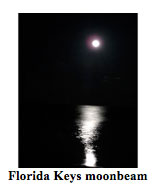
—————–
A dark grey skied afternoon. Three motorcycles were stopped in a torrential rainstorm atop a Keys bridge. The wind speeds were so high that the bridges should have been closed, but the Florida state highway patrol was nowhere to be found. The rainsuited riders were holding onto the bikes with all they had.
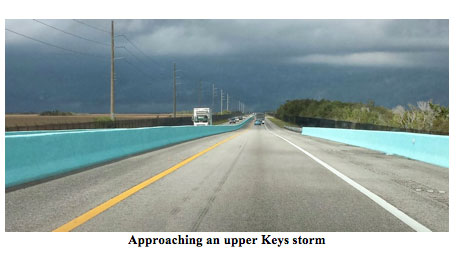
Suddenly the lightening strikes came, so tremendous in their energy that it almost pushed them from their seats; so quick, fierce, bewildering that they could think of nothing but to hold on. Then the rain split with a hiss followed by hoovering sounds, somewhere to their left, was indicative of an approaching, unseen but powerful water spout.
One of them was trying to speak to the others over the howling winds. He had no success, while the other two strained forward over their handlebars to hear what he said. Suddenly, there was a white flash and violent boom.
Marlow threw back the sheets and jerked straight up in his bed, horror struck. He was back in his home.
His wife comforted him, stroking his head and saying “It’s alright. Go back to sleep. Shh.”
The biker rolled onto his side and fell back asleep immediately, hoping for sweet dreams.
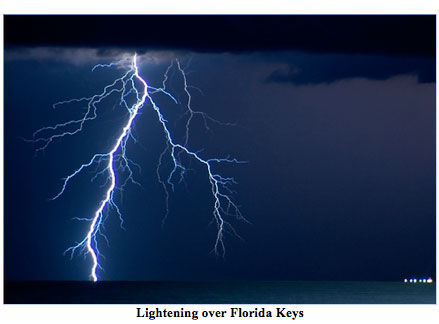
Marlow and his fellow bikers’ houses stood peacefully and safely along suburban streets with others like them. Security lights blinked on when critters, big and small, passed through unseen trigger beams. They blinked out one by one after a few seconds passed. The streets were quiet and still, sleeping under moon-beamed skies. Half the driveways had cars drawn up close to closed garage doors.
A turned over bicycle with its rear wheel still spinning layed close to the open side door of one of their garages.
The riders’ good and decent neighbors slumbered, dreaming whatever dreams they dream.
Copyright © 2017 From My Isle Seat
www.vicscotra.com
Life and Island Times: Alabama Jack’s
Instead of tracking straight down the eighteen mile stretch to the Keys northern end of US 1, Marlow detoured them one last time off the beaten path just south of Florida City onto state route Alt 905. It winds through the glades and salt flats to a rustic place out in the mangroves.
In troubled times, people look to escape from reality more than ever. The media was saying the economy was in crisis. No one needed daily 30 point sized newspaper headlines to know that gas prices and unemployment were way up, while home prices were way down.
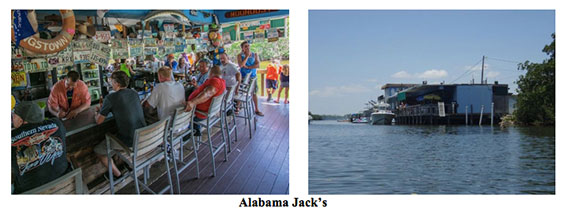
This hideaway was one of those special places, where an occasional cool breeze mixed with the ceiling fan gusts to chill locals looking for an hour or two of respite.
Alabama Jack’s is nestled at the northern foot of the Card Sound Bridge. Floating on two roadside barges, AJs is the focal point of a ramshackle houseboat community. Locals have dubbed it the official “Downtown of Card Sound.” As a throwback to an earlier South Florida time and place, this roadhouse provides working class redneck boys and girls affordable, homemade food from family recipes.
Listening to juke box tunes — live music on weekends, folks sip cold beer straight from long neck bottles or drown their sorrows with distilled spirits. Appropriately when these riders entered the joint, the chorus of Lowell George’s tune Dixie Chicken was blaring from the music system. True to form, there were several Tennessee lambs seated at the bar eating the daily special accompanied by plastic cups of Coke and some low-down southern whiskey.
In Marlow’s ten years of patronage, he’d never seen a Barbie Doll type woman in the place. Female patrons’ calloused hands there didn’t lift flutes of champagne to their lips while noshing on canapés.
Patrons flocked there because their tender hearts required a honky-tonk where Skynyrd, L’il Feat and George Strait were played over the smell of yam fries and burgers.
In between food and drink deliveries, their 50-something waitress told her story of love gained, lost and found again. All of her life’s threads seemed woven into the down-on-your-luck fabric of Alabama Jack’s. She said that the place’s music and dancing helped her forget her problems.
They departed with a full bellies and hearts reconnected to the world’s harsh realities from which they had been escaping during past five weeks.
Copyright © 2017 From My Isle Seat
www.vicsocotra.com
Life and Island Times: Augustus’s Song
As Augustus awoke, his dream’s music — an anthemic, long ago, blues tune — faded into Marlow’s snoring and then into the great green lake O’s soft wave action caused by a tall dark storm brewing to the north. But the song kept on in the background.
Augustus quickly downed a complimentary cup of dishwater coffee in the motel front office and headed out to start packing his bike. He absentmindedly turned on his bike’s satellite radio. There was nothing.
He tried the starter. It didn’t turn.
His dream song started playing louder.
My starter won’t start this mornin’
Man my engine won’t even turn
My starter won’t start this mornin’
Man my engine won’t even turn, turn
Been fast-runnin’ lotta country roads to ruins
Now my scooter got troubles abrewin
My starter won’t start this mornin’
Man I hope there aint nothing wrong with my little machine
My starter won’t start this mornin’
Man I hope there aint nothing wrong with my little machine
Marlow says ‘”Your battery’s shot all right and
We’ve been burnin’ bad gasoline.”
My starter won’t start this mornin’
And I’m about to lose my mind
My starter won’t start this mornin’
And I’m about to lose my mind
Gotta get on the road, see the final place
But my Harley is all outa time
Maybe there’s water in my gas tank
and my battery’s all run down
Maybe there’s water in my gas tank
and my battery’s all run down
How’m I gonna start today’s final chase
If I can’t get outta this lonesome place
My starter won’t start this mornin’
And my Harley won’t do a thing
My starter won’t start this mornin’
Now my Harley won’t do a thing
I must begot some kind of bad disconnection
Somewhere in my piston ring
Marlow had awakened by this time and was sipping on his cup of office coffee when he ambled up to Augustus and his stricken bike.
“Time for a new battery, eh?”
“Looks like it.”
“Since I was here last, there’s a new auto parts store on the town’s edge that we passed on our way in here. They’ll likely have one.”
“Yup.”
After the clerk filled the new battery with fluid and quick charged it – good for a couple of starts max, Marlow whisked it back to the motel. They commenced the install only to discover that Marlow had left the special universal connectors back on the store’s counter.
“Sonuvabitch!” he exclaimed to no one in particular as he peeled out of the motel parking lot to fetch them.
After this second trip to the store, the battery install was completed. The initial starting attempt was an abysmal failure.
“Sonuvabitch to the goddamn 10th power!” exited Marlow’s lips.
After disconnecting every piece of power eating equipment (GPS, XM satellite radio receiver, light bar, cell phone charger, iPhone) from his bike’s electrical bus, Augustus’s machine softly coughed then roared to life after several last encouraging Die, you sonuvabitch, die! words of warning from Marlow.
Letting the engine idle to continue charging the battery, they loaded up their bikes. They tight boogied out of Clewiston onto the back roads of Florida’s cattle and big sugar countries, Seminole and Miccosukee Indian rezs and the Everglades.
These landscapes are little known or visited by outsiders, since many of these county roads are not depicted on paper or digital maps.

Instead of tracking straight down the eighteen-mile stretch to the Keys northern end of US 1, Marlow detoured them one last time off the beaten path just south of Florida City onto state route Alt 905. It winds through the glades and salt flats to a rustic place out in the mangroves.
Copyright © 2017 From My Isle Seat/Van Zandt
www.vicsocotra.com
Arrias on Politics: Hobbes and the Deep State

Years ago, I listened to a man discussing how to rescue troubled organizations. Among other things, he said real change was never easy, and it was never accepted by most of the people — even in organizations that were failing badly, and the only way to make change “stick” was to make it fast and radical. Incremental change didn’t work, and in particular, slow change didn’t work. And if you went into an organization and took 3 to 6 months ‘studying the problem’ you’d be co-opted by the system and end up accomplishing little.
There’s an interesting political philosophy that explains that wisdom, a book written during the English civil war, by a rather dour individual – Thomas Hobbes: Leviathan. In it, Hobbes describes how governments work to bring order.
But, it’s in the details where Hobbes really gets interesting, because while the system and process Hobbes was discussing was that of an all-powerful government, the essence of his argument applies to any organization; the larger the organization, the better the fit.
In any organization, those who obey the rules are treated well by the organization; those who break the rules are viewed as a threat. Those who aid the organization are rewarded by it; the more they aid it, the more the reward. Conversely, those who do anything that threatens the organization are the enemy. The larger or more powerful the organization, the more extreme are both rewards and punishments. This is particularly true in regards to government, and specifically, to the federal bureaucracy. Loyalty flows not to some amorphous “nation,” but to your specific organization, to the bureaucracy; it’s the bureaucracy that’s protecting you and providing for you.
Virtually every organization acts this way: you join a club or group of some sort, you provide it support, and the more you help it, the higher you go in the club; maybe you become the club president. A company is much the same: you join, you adopt the rules of the company (always wear green shirts, smile at the customers, sell more widgets, etc.) and you get promoted.
But large government bureaucracies are, of course, what Hobbes was talking about: join the Navy, become a “Navy Man,” do Navy things in a Navy way: the Navy promotes you. Loyalty to the Navy is “expected.”
But where does your real loyalty lie? Is it with the company? The club? The Navy? Or is it to your families and to the Constitution (which in the case of the Navy, is what you swore to protect – not the Navy)? To Hobbes (a strong monarchist), the monarch, and his bureaucracy, was the state.
Modern nations, in particular the United States, have a different perspective: the bureaucracy is a servant and a tool of a nation. Power technically resides in the citizenry. But in fact, power flows increasingly into the bureaucracy, pulled out of the hands of the citizens; bureaucracy becomes the master, the people the servants.
Given enough time, organizations become very protective; they develop rules and language that protect them from outsiders. Consider the rise of the Mandarins in Imperial China, who built a bureaucratic structure – to enforce the Emperor’s laws – that was so complex, and used such arcane language, that no one could understand it, except them. Their power and position was therefore protected. Anyone who’s watched the budget process in the DOD will begin to get an idea of this sort of “insider language.”
The “Mandarins” become the leaders of their “Deep State.” Every bureaucracy will, in fact, strive for that. Every bureaucracy will use the tools at hand: the ability to craft rules and regulations and processes, both in the budget process and in the hiring and firing process, that seek to ensure that only those internal to the bureaucracy itself can effect change. And anyone outside the bureaucracy who tries to change things, who “threatens” the organization, is the real enemy. The bureaucracy will burrow in and fight for survival; it’s needs being far more important than the needs of any such amorphous thing as “the nation.”
Which leaves us where?
The federal bureaucracy is huge, complex, and committed to itself. Mr. Trump wants to change it. The bureaucracy is fighting back. Many members of the bureaucracy are committed to their organization, fully convinced they’re doing the right thing. For them, as members of the bureaucracy, the rest of the nation simply is wrong. Call them mandarins, or the “deep state;” call them what you will. But Hobbes understood them. And they are real.
Copyright 2017 Arrias
www.vicsocotra.com
Life and Island Times: Florida Backroads (cont)
As they exited the burnt wasteland, they were only minutes from Lake O’s north shore.
At its northernmost tip, they detoured up onto the US Army Corps of Engineers built earthen rim, also known as the Herbert Hoover Dike. They were relieved to see that Lake O’s water level had returned to normal since its indiscriminate 2006 emptying had placed south Floridians on permanent water restrictions.

Lake Okeechobee, the liquid heart of South Florida, is 730 square miles and has an average depth of 2.7 meters (9 feet). It is the second-largest freshwater lake wholly within the continental United States, second only to Lake Michigan. This three way shot shows the lake from right to left: June 2000, January 2003, and June 2007. Its shrinkage is particularly evident on its west and southeast sides. Images courtesy of NASA/METI/AIST/Japan Space Systems, and U.S./Japan ASTER Science Team
They then rode through a place that time forgot. Somehow left helplessly frozen in the mid 1950’s, the town of Pahokee contains two of Marlow’s favorite things to show new visitors: a long, Royal Palm tree lined lane along the lakeshore and the weirdest idea in cross marketing seen to date.
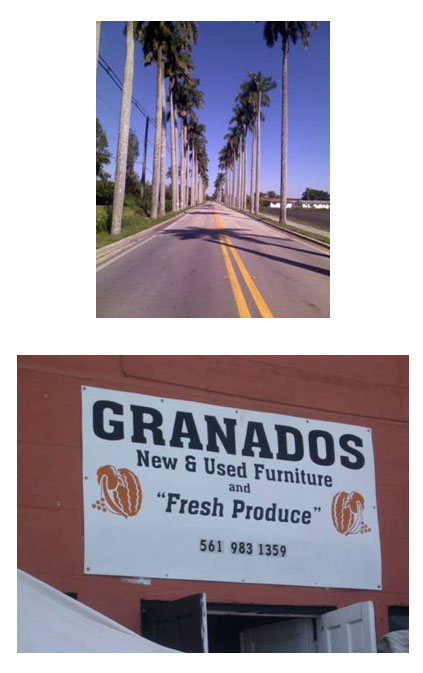
They stopped for the night on the southern shore of Lake O in Clewiston, putting down US 27 to a motel trimmed in purple paint and neon, run by native-dressed Pakistanis and garishly lit at night like a fluorescently cheesy Las Vegas strip club.
Augustus described the room’s interior décor as 1950’s bordello with its over-painted, textured velour wallpaper. The sign out front said these were NEW CLEAN ROOMS. The motel’s operators confirmed upon check-in that they had recently painted everything.

They celebrated the trip’s coming end the next day by supping on local fried chicken and guzzling the remaining Blue Sapphire gin.
Strange technicolor dreams resulted from this admixture of British spirits and Cajun spiced cooking. This excursion into a Zydeco shadow land was suffused with French Canadian accented songs intermixed with images of a Creole-speaking Strother Martin from the movie Cool Hand Luke.
Copyright © 2017 From My Isle Seat
www.vicsocotra.com
Life and Island Times: Florida Wasteland

Somewhere south of the abandoned real estate developments and failed dry land shrimp farms in central Florida, floating ash began to hit their windscreens. All around them ash fell, silently, covering the roadside and the fields beyond, transforming them. They were both stunned, unable to comprehend, staring at the transformed world, carpeted by ash. A vast, barren, dead expanse of ash covered earth, lifeless, forlorn and dark grey, lay spread flat before them.
They slowed down. Augustus came alongside Marlow.

“Is the world dying?” Augustus asked.
“No. Not now.” Marlow replied.
“I hope not.”
“Might be a sugar cane field burn that got loose. They call them ‘money burns.’”
“I forgot that you are Irish. Surely, everything is ending; but, as you’re wont to say ‘not yet.’”
The ashen and smoky sky dulled the sun. They heard a piercing scream of a raptor off in the distance. They motored past the ash covered gravel parking lot of a long ago, demolished gas station.
They slowed down further, so much so that their boot heels dragged alongside them, leaving sidewinder snake slithering marks atop the ash powdered pavement.
They spent very quiet moments as they watched this particulate darkness fall.
Suddenly along this desolate road what was once a farm and abandoned silos loomed ominously, still standing. These ruins slid out of view as a gust of ash and smoke obscured them.
They slowed to a stop to examine some animal footprints in the ash. They looked to be those of a four legged mammal, perhaps a Florida panther.
They listened and heard a low thudding of drums in the distance. Still the ash fell.
They noticed tied to a dead sapling a thin green neckerchief. A sign? Perhaps. But nothing else came into view.
Out of the murky sky more gray snow fell. They were almost lifted out of their saddles when a sudden noise, a loud thunder crack and concussion wave – this time very close behind – hit them. They looked around just as out of nowhere it began to rain. The ash snow lessened then stopped as the rain continued. The landscape became a lifeless dark grey black soup.
As the rain slackened and then stopped, the riders coughed reflexively until they could cough no more. Blackish grey colored drool unspooled from their lips onto their black jackets.

They then rolled into a blackened chasm of burnt grasslands and sugarcane fields. The few surviving roadside Melaleuca trees were both emaciated and exhausted, coated in grime and soot from the burned, blackened landscape around them. A sickening sweet smell abounded. The land was a desolation, lifeless, and without movement.

There was a low rumble, the winds freshened and they could smell another rain storm coming. A line of squalls must have put out the recent fires in this remote section of south central Florida’s decade long, drought land.
There was a long shear of bright light, then a series of low concussions. The air temp dropped and the air scent cleared momentarily.
Further on, burned, broken asphalt fissures opened up alongside the road, obviously from major road edge burns during rain showers. Then they crossed a section where fire has crossed the road melting the tarmac. They looked for prints in the tar to study. There were none.
The riders slowly edged past a small pond filled with dead pencil thin trees. They then headed down a long straight road through a dark, forbidding tunnel of dead trees. As soon as they exited this columned hell hole, the everglades engulfed them in a rich lush greenness.

They were now deep within an Indian reservation somewhere near Lake O.
Copyright © 2017 From My Isle Seat
www.vicsocotra.com
Life and Island Times: Florida Backroads
Marlow had the lead for the day. They were traveling on roads with which he was very familiar. Oblivious to any residual bad luck, they putted past the scene of Steve’s final breakdown on US 19 before joining US 27. The Florida section of this original northern Indiana-to-Miami road still possesses much of its charm. US 27 has good bones. You must look well beneath all the accreted tacky build up from the 80s and 90s.

It was more than mobile home parks, strip shopping centers, sinkholes, crap real estate developments, Indian names ending in atchee, horse farms and orange groves. It was a trip back to Florida’s prehistoric vegetation and geology of the dinosaurs.
At a late morning fuel stop in Ocala, they spotted a business sign that spoke to them. It noiselessly said that within awaited great, not just good, food. This would be the day’s brunch stop. Once inside, this diner’s neighborly atmosphere gathered them up into its arms and snuggled them.
The waitress was warm and funny, quick and sharp. The food was wholesome and generous, cheap and local. Aunt Fannie’s was an American restaurant where road trippers ate well, paid less, and should tip more than 18%.
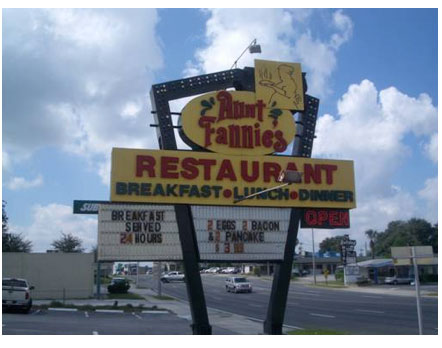
They made as quick a crossing of the metro Mouseland area as humanly possible.
The day’s next trip in the way back machine along the shores of Lake O was delayed by what followed next.
Copyright © 2017 From My Isle Seat
www.vicsocotra.com
Happy Birthday!

I called Old Jim on the cell this afternoon. I had not talked to him for a week or so, and wanted to check in once I realized that it was his birthday.
Heather and I were talking about it at The Front Page last night. Jon-without-an-H was on her other side, marking the four-month anniversary of his current “between gigs” period. “It is amazing how time flies,” he said.
“No kidding,” I replied. “And it seems to be accelerating.”
I am upbeat about his prospects. Jon-without is too talented, smart and well-dressed to be on the street very long, but it is a crap shoot out there these days. I don’t know if age discrimination is a factor. Goodness knows I would not hire me to do anything involving heavy machinery or prescription drugs. But the one of the topics of conversation was how old Jim really was. We remembered the 70th; Willow has now been closed for more than a year and a half; Jim an Mary had decamped for retirement in Las Vegas at just about the same time. That marked the Willow dispersal Diaspora. John-with-an-H had announced his preference for the Lynon Fall Happy Hour, and then developed a spinal condition that resulted in major surgery. We may or may not see him when he is mobile again. Then there were the girls- Joy and The Lovely Bea and Jamie through marriage and relationship and career changes.
It was tough losing them all at once, but for the predictable reason that The Front Page was not as convenient to visit as Willow, jobs and relationships changed, and life is just…well, you know. Complicated.
The Willow Regulars had suffered gapping holes in the ranks. Mac Showers had passed on. Barrister Jerry was among the missing, as were both versions of the Mikes- Long and Short Hair, and JarHead Ray and White House Ray; The Missile Twins did not come to Front Page, choosing to stay on the safe side of Glebe Road at Ser, the vaguely Mediterranean-themed place near the CACI Building on Glebe. K2 was only an occasional player these days- he works in the National Science Foundation in the offices above the bar, and his position is that he sees enough of the people he works with and doesn’t have to drink with them.
The people we continue to see includes Liz-with-an-S, Heather, JPeter and Jon-without. It always brings me up short to not see irascible Jim’s glower at the corner of whatever bar we were in. During one of his periodic boycotts of Willow, we tried coming to the Front Page, but it just did not click. Not then, anyway. And in the end, the fellowship of the friendly staff and owners always brought him back.
That, and the simple fact that Willow was the closest bar to his place, which minimized the effort to limp down Utah Street to his usual stool.
We finally decided Jim was 73, and left it at that. I was pleased that I remembered to call him this afternoon. The time difference was a problem, since when I first remembered to be thoughtful it was way too early to bother Vegas.
The whole notion of Willow and entropy had been explained well by George, Front Page’s Greek owner. He looked us over and christened us the “South Side,” since we normally congregated on the side of his bar that faced the mall across the street. “I had a bunch like you at my other pace downtown,” he said. “They were a regular group of drunks and always sat in the same place. They came in for years, but you know drunks. They lived hard and it eventually caught up with them.”
I looked at him blankly and realized he was right. We had been going to the same bar and sitting in the same stools for a decade, and eventually entropy was going to get us. It is what it is.
So this afternoon I called Jim’s cell number. It is still a DC area code, so it is a little strange calling it with the intent of talking to someone in the Desert. He picked up after two rings, and we had a great chat. His vision therapist had just departed, raving about the exceptional progress Jim had been making. “You will be back to writing Blank Verse in no time,” he said they told him, and I told him we had decided he was 73.
“Bull.” he said firmly. “It was a February day in 1943, and the fate of the war was very much in doubt until I arrived. I am 74 this year.”
I thanked him for the correction and wished him the very best returns of the day, and asked that he convey my very best wishes to his bride, Chanteuse Mary. He said he would, and reminded me to come out to Sin City soon. I told him I would get right on it, and we ended the call.

If I manage to live as long as Jim has, I am confident of one thing: sitting at the stool next to him at Willow, and hanging out with The Regulars, made that time the best decade of my life. I seriously doubt if I will see the like of it again.
Happy birthday, Jim!
Copyright 2017 Vic Socotra
www.vicsocotra.com
Arrias on Politics: Why Don’t We Win?
 Secretary Mattis: everyone seems to hope he’ll bring some sanity to national security. Perhaps he can even win these seemingly interminable wars. Maybe. But consider Hannibal:
Secretary Mattis: everyone seems to hope he’ll bring some sanity to national security. Perhaps he can even win these seemingly interminable wars. Maybe. But consider Hannibal:
He was, perhaps, the greatest tactician in history. For 14 years he ravaged the Italian countryside; despite being outnumbered, he defeated every army put against him (in one 6 hour battle his 50,000 man army destroyed a 120,000 man Roman army, killing perhaps 80,000); in the end Rome only defeated him in battle after his key ally was paid off and switched sides – hours before battle.
There’s much to learn from the Second Punic War, but the most important lesson is at the root of the most dire question:
Why doesn’t the US win wars?
To be clear: the US (like Hannibal) is consistently, decisively successful on the battlefield. Why doesn’t that translate into final victory?
That question is asked again and again by various experts and their answers are legion: but most answers suggest that political machinations – often termed “policy” – have replaced real strategy for most decision-makers.
But there’s another – much more significant – problem.
As noted, we’re superb tactically; we don’t lose in combat. We haven’t lost a battalion sized operation or larger (a battalion is about 500 men), since 1953.
Therein lies the first truth: wars are NOT about technology, or tactics or doctrine; they’re not about organizations or training plans or operational plans or leadership councils. And they certainly aren’t about diversity or inclusiveness. Wars are about will.
Victory means your will prevails; the enemy yields.
If you want victory you must have the will to expend the energy, and commit the assets. But most importantly you must have the will to commit to whatever violence is necessary to impose your will on the enemy. If you don’t, he will impose his will on you. You break his will, or he breaks your will; his will or yours must prevail.
At that point, the war ends. One side decides it’s “spent” enough, one side refuses to yield. Rome understood this – with amazing clarity – for more than 1,000 years.
One way to achieve that clarity is make certain you never go to war unless you absolutely need to. The subsequent point is: but if you do need to, then you fight to win. That was based on a simple concept: belief that preservation of our society was of greater importance than the preservation of any other society.
But, most of the news media, a significant slice of our political leadership, and much of our academic “leadership” believe in “globalism,” in the equal value of all cultures, in the idea that nothing about our nation warrants placing it ahead of any others. If so, there’s no point in sustaining our society over theirs; there’s no reason to fight for victory. If one society, one view of the world, is no better than another, why fight to impose that view on someone else? Philosophical ambivalence cannot produce the will to fight and endure. In practical terms this translates into a requirement that warfare be as antiseptic as possible; we aren’t trying to make the people of country “X” change, we’re only trying to defeat the particular force facing us.
But defeating armies doesn’t win wars; ask Hannibal. We consistently defeat every army we face. But if we haven’t defeated the people, if we haven’t broken their will, or at a minimum the will of their leadership, than all the tactical success in the world will not suffice.
Thus, guidance from policy experts that suggests that we must strive to make war antiseptic may make it impossible to win. The enemy can still win, because they aren’t playing by the same rules we are. But we can’t, the rules won’t let us reach that point where the enemy population and leadership is convinced that continuing the war is worse than surrendering.
Clausewitz, the German field marshal, noted that: “…war is such a dangerous business that the mistakes which come from kindness are the very worst…”
What that means is this: Before going off to war, the nation must be all in or not in at all. So, hold a debate, write and pass a clearly worded declaration of war. Then go and fight for victory – no matter the cost. Or don’t go at all.
Until Congress and the media and academia understand that, it will matter little how hard Secretary Mattis or President Trump work to produce victory. Victory is a product of our national will.
Copyright 2017 Arrias
www.vicsocotra.com
Life and Island Times: Thoughts on Motorcycle Morality and Aging
Editor’s note: Many years after Steve’s decision to keep his Valkyrie he still has it along with a new Gold Wing. His devotion to this almost twenty year old family member prompted this loopy piece.
Advances in modern motorcycle technology mean that motorbikes are living longer than ever before. This raises important end-of-road-life issues, as it becomes increasingly difficult to provide leaded fuel and shelter for this hydraulically challenged, aging two-wheeler population. Qualified repair garages are full, and off-street parking is beyond the financial scope of most low and middle income biker families. It becomes a case of rust or bust.
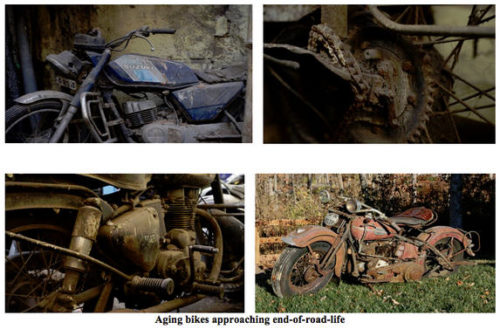
Biker society members have long been reluctant to countenance the concept of actively ending the road-life of their beloved motorcycles, preferring to allow Nature to take its course. On the surface it seems simpler to let the natural phenomena of corrosion and obsolescence take their inevitable toll, until a head gasket blows and the piston rods seize up irrevocably.
But can we afford to allow pour elderly scooters to simply clank, wheeze, choke and sputter as American roads become increasingly over populated and earth’s atmosphere ever more polluted? These old bangtail scooters demand attention, as their paint peels and fades, engine crankcases suffer oily discharges, balding tires leave tread chunks at every stop sign, suspensions sag, and chrome corrodes. Is there an alternative for these ailing bikes and their gummed up carburetors?
The principles of vehicular rights dictate that the road should be shared equally among all bikes, regardless of color, cubic capacity or country or origin. All motorcycles have a right to ride on the traffic circles of life, even if this can be a dizzyingly circular argument. But other over-riding principles also warrant consideration. The life of a new motorcycle, fresh from the showroom floor, is one of great expectations, as riders with dreams of backroads spend endless hours buffing the exterior sheen and sniffing the new bike leather saddle smell.
As a motorcycle approaches the end of its natural road-life, however, its existence becomes much less pleasurable. Metal fatigue sets in. Every joint and ball bearing complains. The prospect looms of the motorbike spending its twilight years on blocks, its odometer inert, its flat battery becoming ever flatter, its plugs barely able to spark. It is now on a slippery slope towards the scrapheap. Even if it is decided that it is no longer suitable for roadside resuscitation, there is no certainty that the bike will do the right thing and develop terminal engine failure.
The biker virtues of loyalty and compassion do not permit many owners to trade their old rides in for new models. Moreover, these responsible owners cannot bring themselves to abandon their scooter on a secluded road in the dead of night: the moral principles of beneficence and motorcycle maintenance preclude such behavior, let alone the traceable vehicle identification number.
Further, it is not merciful in the least to leave the ancient two wheeled family member to rust in one of those sad roadside nursing homes for aging bikes. The quality of mercy is not strained, nor is their engine oil filtered. What sort of way is this to treat an elderly member of the extended family who provided thrilling road companionship for the biker during all those years? Such behavior contravenes the moral principle of junker justice.

Most riders and their mechanics are loathe to give these ailing creatures a lethal fuel injection, but there are alternatives. A quick and painless crush in the compactor at a modern scrapyard, and at least the old Harley could fulfill a useful function as a piece of yard art sculpture.
Motorcycles do not have an intrinsic right to road-life, yet there comes a time when we riders should cease ordinary and extraordinary means of support and accept that all motorcycles will eventually end up at the Pearly Gates. Premature compaction is ethically acceptable, if it is in the bike’s best interests to end its road-life, and if the bike is fully informed of the implications, and competent to consent to the process. The key moral principle is quality of road-life: the indignity of a noxious backfires, grating six speed tranny noises and a corroding frame, the so-called axle of evil, may outweigh the thrill of an occasional biker spin atop the old girl on local country roads.
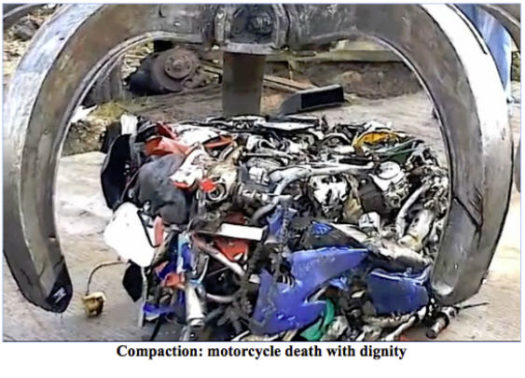
In closing, let us assume that our elderly motorcycles wish to end their road-life with dignity. Providing they are fully aware of the significance of this decision, the principles of motorcycle-autonomy dictate that we riders should fulfill these final wishes by putting a timely and compassionate wrench in its works and running it at high speed without any oil in the crankcase, followed by a dignified compaction.
Copyright © 2017 From My Isle Seat
www.vicsocotra.com
